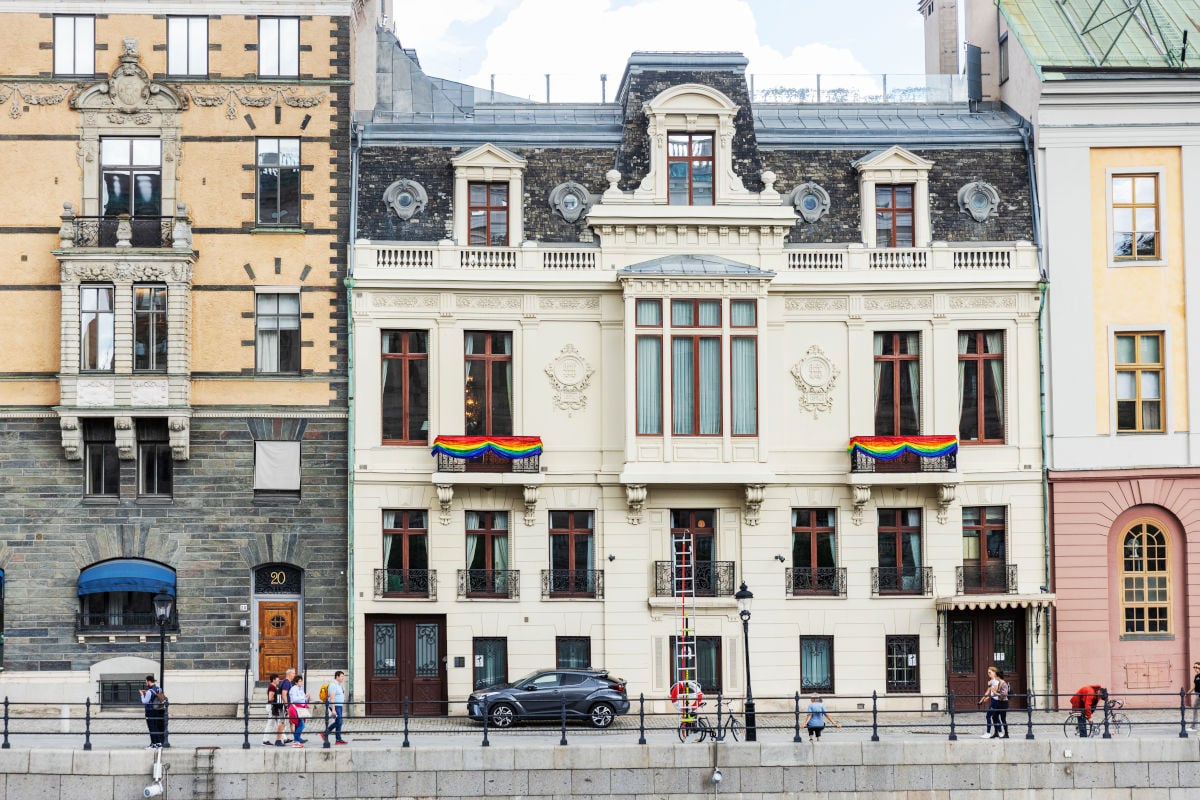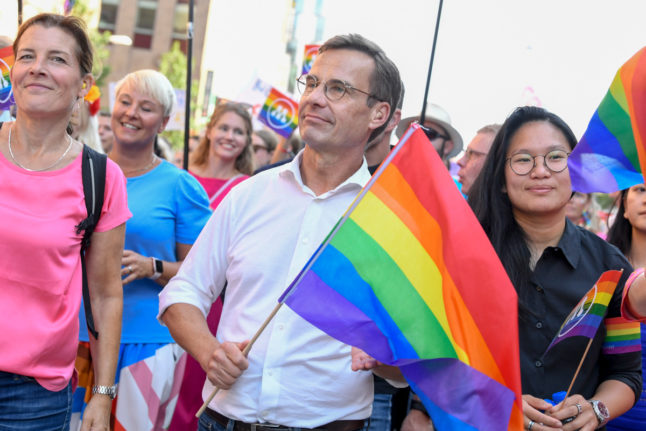The rainbow flags outside Swedish Prime Minister Ulf Kristersson’s official residence, Sagerska huset, seemed calculated to send a message that reached far beyond the people gathered inside for his Pride reception: when it comes to rights for gay and trans people, this is a liberal government.
The guests at the big gay party included politicians from other political parties – including former Social Democrat leader Mona Sahlin, Green MP and LGBTQI activist Ulrika Westerlund, as well as ministers from the Christian Democrat and Liberal parties.
They also included American ambassador Eric Ramanathan and Israeli ambassador Ziv Nevo Kulman, both of whom are gay, and celebs like dramatist and author Jonas Gardell and singer Magnus Carlsson. The Prime Minister’s wife Birgitta Ed offset her clerical dog collar (she’s a priest in the Church of Sweden) with a rather spectacular dog-themed dress.
OK, and a bunch of media gays somehow also made the guest list, including your correspondent.
Lots of guests wondered aloud beforehand whether it was right to accept hospitality from Kristersson, given his alliance with the Sweden Democrats, but most of us seemed to quickly overcome our doubts.
I’d like to say I went because the reception sent an important message that the Swedish government embraces an LGBTQI community that governments elsewhere actively persecute, but I’ll readily admit I accepted mostly because it sounded like fun – you don’t often get to see the prime minister’s house from the inside.

Conspicuous by his absence was Sweden Democrat MP, former deputy speaker and leader of the Swedish delegation to the OSCE, Björn Söder. The man who earlier the same week claimed on X (that’s Twitter to you and me) that by linking himself to the Pride movement, Ulf Kristersson was “legitimising paedophilia“.
Söder’s salvo in the culture wars appeared to breach the agreement between the Sweden Democrats and the government, which obliges the parties to speak “respectfully” about each others’ leading representatives. Perhaps that’s why Kristersson felt liberated to hit back, describing Söder’s words as “grotesque” and “deeply offensive”, but Söder’s spirit still hung like an Orbanist Banquo over Saturday’s reception.
Kristersson personally has an excellent voting record on LGBTQI issues, stretching back to the mid-90s when he rebelled against his party and voted for same-sex partnerships.
These days his party has caught up with him – even the chairman of Stockholm Pride is a Moderate politician, Fredrik Saweståhl. Perhaps Saturday’s reception was an attempt to draw attention to this. But the events of the past week have laid bare a gulf in values between the three parties of the governing coalition and the Sweden Democrats.
The gulf is perhaps widest between the Sweden Democrats and the Liberal Party, whose minister Paulina Brandberg is currently trying to enact a self-identification law that will allow trans people to change legal gender through a simple online declaration.
Söder’s tweets followed similarly offensive statements, this time about Muslims, from Richard Jomshof, the Sweden Democrat chair of the Swedish parliament’s Justice Committee.
When Sweden is being pilloried in the Muslim world for Quran burnings and when the country’s Nato application is dependent on Turkish goodwill, Jomshof chose to describe the prophet Muhammad as a “warlord, mass murderer, slave trader and bandit“.
That time Kristersson’s response was notably more muted, merely saying that Jomshof should “be careful how he expresses himself”.
So how can Kristersson continue to govern in partnership with the Sweden Democrats, when their values are so at odds?
Government ministers themselves point to the Tidö agreement, under which cooperation with the far-right party is limited to a number of key areas and there are no Sweden Democrat ministers.
But the fact remains that Kristersson is entirely dependent on them to stay in power – something he seems determined to do. But with Sweden Democrats seemingly intent on waging a culture war, the veneer of respect between them and the government could soon be wearing very thin.
Politics in Sweden is a weekly column looking at the big talking points and issues in Swedish politics. Members of The Local Sweden can sign up to receive an email alert when the column is published. Just click on this “newsletters” option or visit the menu bar.




 Please whitelist us to continue reading.
Please whitelist us to continue reading.
The Moderate Party has held anti-immigration positions since the 2000s. Mr Kristersson’s deal with SD required a more restrictive position and affirmed SD’s xenophobic rhetoric. A judicial investigation from RFSL found LGBTQI asylum cases refused on unlawful grounds and it will only get worse, with both parties wanting to reduce asylum to as close to zero as is legally possible within the EU. https://www.rfsl.se/en/organisation/asylum-and-migration/rfsl-slapper-ny-rattsutredning/
He who sows the wind will reap the whirlwind.